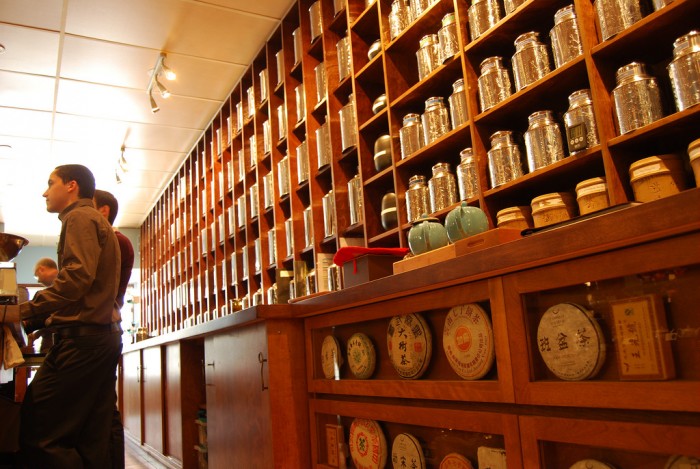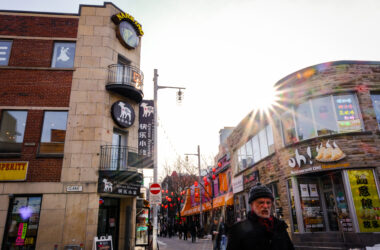There is a unique experience around each corner in Montréal. Of the many internationally-inspired cafés, Camellia Sinensis Tea House, nestled in Montreal’s Quartier Latin, is the epitome of serenity. Located on Rue Émery, this gem allows customers to escape from the fast pace of the city and enjoy a cup of tea without the ties of electronic devices. Founded in 1998 by four tea connoisseurs—Kevin Gascoyne, Jasmin Desharnais, François Marchand and Hugo Américi—the tea house continues to showcase a plethora of carefully selected teas from each co-owner’s annual spring travels around Asia.
Every inch of the tea shop’s interior emanates tranquility. Dim lighting, hushed conversation, warmly-coloured walls and furniture, and a welcoming staff all contribute to its sense of calmness. The zen music played in the tea house is carefully selected from a wide range of styles to uphold the coveted ambiance. Table seating is restricted to two or three people to avoid large groups and to permit quiet conversation. The staff even strike a gong to signal when the noise exceeds a comfortable level.
Perhaps one of the most unique aspects of this spot is its tech-free enforcement, which was implemented several years after the tea room opened.
“At one point, I came into the tea house and there were probably 11 laptops open,” Gascoyne said. “Nobody was talking to each other and the whole art of conversation was lost.”
This concern over customers’ distraction from the present drove the owners to eliminate Wi-Fi from the shop entirely. The intention behind this is to provide an honest experience in which the customer is focused on the imported tea and the present moment—not on their cell phone.
“Something that is quite different from other places that you go is that there is just this ripple of conversation, people reading books,” Gascoyne said. “You get this very mindful sense of present space.”
Though the choice to remove Wi-Fi in the midst of today’s technological era was a daring one, customers have responded very positively.
“What keeps me coming back is absolutely the calming, zen atmosphere and superb tea,” said Samantha Simpson, a U2 Finance student and a frequent guest at Camellia Sinensis. “The no [tech] zone offers a rare opportunity to enjoy a book or your friend’s company without any distractions.”
Another key component of Camellia Sinensis is its educational facet. In particular, the Camellia Sinensis team has published prize-winning tea books, operates two tea schools—one in Montreal and the other in Québec City—offering over 20 workshops and courses, and they even hold conferences tailored to address specific questions about tea and its health benefits.
“We’re involved in all sorts of educational programs,” Gascoyne said. “All related to this catalogue that we put together every year of the teas we buy in Asia.”
Housing 243 teas—each bought directly from growers across Asia—Camellia Sinensis’ tea catalogue has gained world renown and earned the shop a position among the high-end tea shops of Montreal.
“What initially drew me to the shop is the [freedom from technology] as well as its high rank in the Montreal tea scene,” Vanessa Antonacci, Montreal local and guest at Camellia Sinensis, said. “The immense variety of authentic teas is definitely what keeps me coming back.”
Each of the four co-owners specializes in teas from different regions of Asia. Marchand, who selects green teas and aged Liu Bao, and Desharnais, who chooses teas of all styles, each specialize in a distinct region of China. Américi’s regional specialty is mainly Wulong and green tea produced in Taiwan, Japan, and Vietnam. Gascoyne’s domain of expertise is black tea, found in regions of India, Nepal, and Sri Lanka. This year’s visit was Gascoyne’s 23rd consecutive spring spent in the Himalayas tasting and meticulously selecting the best single lots of tea for the shop.
Given the shop’s extensive and diverse array of high-grade tea offered, Gascoyne understands that it can be quite daunting to novice tea drinkers. As such, he and his co-owners strive to make the shop accessible to all.
“We really [aim] to have [our tea] as a democratic product,” Gascoyne said. “Everybody could taste how good tea is, regardless of whether they know at what altitude it was grown at or the cultivar it was made from.”
“The ideal visit is to let us introduce [one] to an adventure in [tea] tasting,” Gascoyne said. An adventure in this off-the-grid environment is all the more exciting.
~~
Visit Camellia Sinensis online here, or visit their Facebook page.









